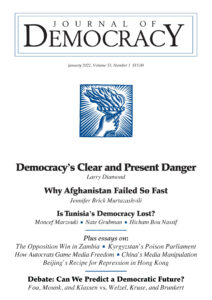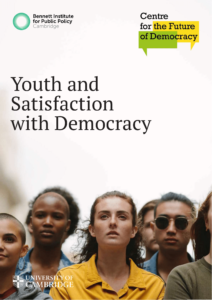Collaborations
We collaborate with other researchers to take on large projects, expand the scope of analysis, and produce ground-breaking results. By working in teams containing complementary skills, we produce more ambitious research outputs in less time than otherwise possible. We can track long-term trends with greater accuracy across more regions of the world or investigate small sub-populations that have traditionally been difficult to study statistically. Having this much data enables answering all kinds of new research questions with greater validity, reliability, and generalizability.
A Crisis of Political Trust? Global Trends in Institutional Trust from 1958 to 2019
12 February 2025 | Viktor Valgarðsson, Will Jennings, Gerry Stoker, Hannah Bunting, Daniel Devine, Lawrence McKay, and Andrew Klassen
In the study of politics, many theoretical accounts assume that we are experiencing a ‘crisis of democracy’, with declining levels of political trust. While some empirical studies support this account, others disagree and report ‘trendless fluctuations’. We argue that these empirical ambiguities are based on analytical confusion: whether trust is declining depends on the institution, country, and period in question. We clarify these issues and apply our framework to an empirical analysis that is unprecedented in geographic and temporal scope: we apply Bayesian dynamic latent trait models to uncover underlying trends in data on trust in six institutions collated from 3,377 surveys conducted by 50 projects in 143 countries between 1958 and 2019. We identify important differences between countries and regions, but globally we find that trust in representative institutions has generally been declining in recent decades, whereas trust in ‘implementing’ institutions has been stable or rising.
A World Divided: Russia, China and the West
20 October 2022 | Foa, R., Mollat, M., Isha, H., Romero-Vidal, X., Evans, D. and A. Klassen
Worldwide attitudes towards the major international powers – China, Russia, and the United States – are shifting in the wake of the Ukraine war, China’s rising assertiveness, and recent challenges to American democracy. The analysis covers high-income democracies and a comprehensive coverage of emerging economies in the Global South to reveal a marked divergence between the two.
The Great Reset: Public Opinion, Populism, and the Pandemic
14 January 2022 | Foa, R., Romero-Vidal, X., Klassen, A., Concha, J., Quednau, M., and L. Fenner
Support for populist politics ‘collapsed’ during the pandemic while satisfaction with democracy continued to falter. We found evidence the pandemic blunted the rise of populism, support for populist parties, approval of leaders, and agreement with populist attitudes, but also a disturbing erosion of support for core democratic beliefs and principles.
Exchange: Why the Future Cannot Be Predicted
January 2022 | Foa, R., Mounk, Y., and A. Klassen
Part of a debate on the future of democracy. Welzel, Kruse, and Brunkert argue that the “democratic deconsolidation” thesis is overblown, emancipative values continue spreading worldwide, and point to brighter democratic days ahead. Foa, Mounk, and Klassen respond that the case for a bright democratic future is based on the mistaken notion that past and current opinion surveys can predict the future, which is no truer today than it ever was.
Youth and Satisfaction with Democracy
19 October 2020 | Foa, R., Klassen, A., Wenger, D., Rand, A., and M. Slade
Young people’s faith in democratic politics is lower than any other age group and millennials across the world are more disillusioned with democracy than Generation X or baby boomers were at the same age. Young people are most positive about democracy under populist leaders of both left and right, and millennials in advanced democracies are more likely to view political opponents as morally flawed.
Global Satisfaction with Democracy 2020
4 March 2020 | Foa, R., Klassen, A., Slade, M., Rand, A. and R. Collins
One of the first reports from the Centre for the Future of Democracy within the Bennett Institute for Public Policy at the University of Cambridge used HUMAN Surveys data. It analyzed 4 million respondents across 25 sources and attracted international media attention from BBC, CNBC, The Times, The Atlantic, Newsweek, International Business Times, and was featured in The Washington Post and The Conversation.





